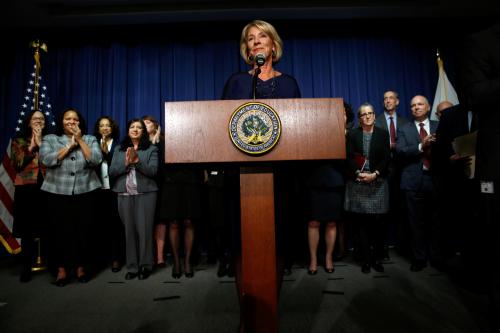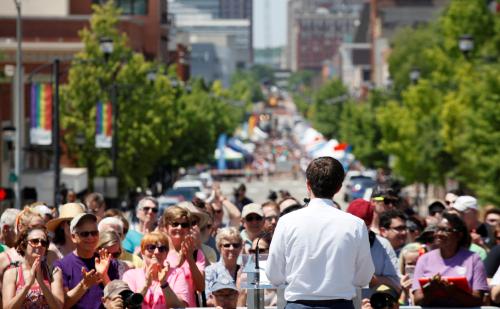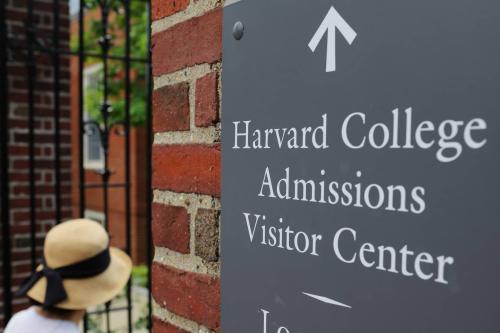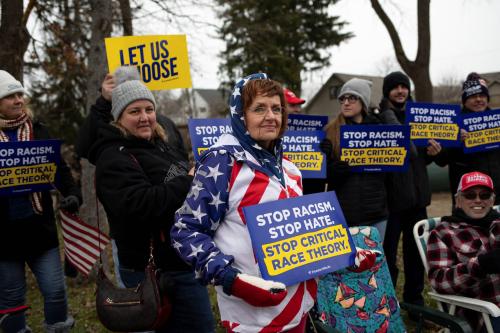An emerging narrative says we are entering a golden age for charter schools and school choice policies. President Donald Trump rarely mentioned education during the campaign but pledged funding to encourage school choice, calling it “the civil rights issue of our time.” He nominated an education secretary, Betsy DeVos, who has almost exclusively focused on expanding school choice, and the Republican Party—long supportive of charters and choice—has sweeping control of state and federal governments. Meanwhile, enrollment in charter schools continues to climb, especially in urban areas, along with enrollment in private school choice programs.
However, the Trump administration’s support of charters and choice may be distracting from—and contributing to—an emerging political threat to school choice programs, especially charter schools: renewed skepticism from Democrats. The 2016 presidential campaign revealed cracks in the foundation of Democratic support for charters, with members of key Democratic constituencies expressing concerns. Those concerns seem likely to intensify in the months and years ahead.
The history of school choice politics
Politics makes strange bedfellows, and this certainly has been true for school choice politics. Early voucher and charter programs were rooted in political alliances between conservatives, motivated by market efficiency and individual liberty, and civil rights groups, motivated by equity and opportunity. Howard Fuller, a civil rights leader in Milwaukee, argued that African-Americans have made political progress only when they had some form of “interest convergence” with those in power. The interest convergence that Fuller found with Wisconsin’s Republican governor, Tommy Thompson (among others), helped create the political conditions to launch the Milwaukee Parental School Choice Program as the country’s first modern private school choice program.
Historically, Republican leaders have enthusiastically embraced school choice reforms, while Democratic leaders have been more selective (and varied) in which programs they support. Many Democrats—and, of course, teachers unions—have been reluctant to embrace either charters or private school choice programs. Many other Democrats, including former presidents Bill Clinton and Barack Obama, have distinguished their generally supportive positions on charter schools from their generally unsupportive positions on vouchers. This distinction might have contributed to charter schools eclipsing private school choice programs in enrollment and public attention.
A recent EdNext report documenting 10-year trends in public opinion suggests that public opinion might not split along party lines in quite the way it does with party leaders. That report found that majorities of both Republicans and Democrats, but substantially higher percentages of Republicans, have supported charter schools. Support for vouchers is more modest in both parties, with Democrats, intriguingly, being more supportive of vouchers than Republicans.
Notably, a large percentage of the public seems uninformed or misinformed about charters and choice. In a 2014 PDK/Gallup poll, for example, 48 percent of respondents incorrectly said that charter schools are free to teach religion and 40 percent said that charter schools can charge tuition. PDK/Gallup observed similar percentages of incorrect responses when it asked those questions in 2006 and 2009. With charter schools more salient in U.S. politics than ever before as political and media elites discuss the DeVos nomination, this could be a period of change in Americans’ awareness and opinion of charters.
The present and future of school choice politics
Public opinion surveys from EdNext indicate that support for vouchers might be trending downwards while support for charter schools has held steady among both Democrats and Republicans (58 and 74 percent in 2016, respectively). However, even the surveys administered in May/June 2016 might not capture the potential effects of recent developments in the politics of charter schools, especially on the Democratic side.
Political parties, and certainly today’s Democratic Party, consist of coalitions of voting blocs with varied, if converging, interests. Since the beginning of the 2016 presidential campaigns, high-profile voices from several key Democratic constituencies have spoken out against charter schools, in some cases unexpectedly. Consider the diversity of perspectives represented:
- The Movement for Black Lives released a platform that called for a moratorium on charter schools, arguing that the expansion of charter schools, along with budget cuts and standardized tests, undermines black students’ learning and educational environments. Around the same time, the NAACP ratified a resolution calling for a moratorium on charter school expansion until charters satisfy certain performance and accountability criteria.
- Hillary Clinton, regarded as a moderate and mainstream Democrat, caught the charter school community by surprise with her claim that charters “don’t take the hardest-to-teach kids, or, if they do, they don’t keep them.” With that statement, Clinton seemed to depart from her supportive earlier stances on charter schools.
- Elizabeth Warren and Bernie Sanders, progressive stalwarts, vocally opposed a ballot measure to increase the cap on the number of charter schools in Massachusetts. That measure failed by a wide margin, revealing an unexpectedly partisan divide in a deeply Democratic state.
- HBO’s John Oliver, less overtly political than the others but with considerable cultural and policy impact, aired a caustic segment about charter schools on his show, “Last Week Tonight.” That segment generated millions of page views and strong reactions from the education policy world.
While these voices might speak to different constituencies in the Democratic Party, one voice heard by all belongs to Donald Trump. Trump and DeVos, divisive figures enormously unpopular among Democrats, could become the public faces of charter schools and school choice. This brings risk. As Shavar Jeffries, president of Democrats for Education Reform, told Richard Whitmire, “I can’t think of anything more potentially harmful to the charter school movement, or anything more antithetical to its progressive roots, than having Donald Trump as its national champion.” This problem could worsen with time, too, if a Trump administration regards school choice as a panacea and fails to address the policy specifics that can determine the success or failure of school choice policies.
While the short-term prospects for charter school policies look bright, the long-term prospects seem cloudy. Charters have tended to grow when and where interests converge, with school choice policies benefiting from dialog across parties. With increasing polarization in how Democratic and Republican leaders are talking—and the Trump administration unlikely to reverse that trend anytime soon—political risk lurks in what is supposed to be a prosperous time for charter schools.






Commentary
Donald Trump, Betsy DeVos, and the changing politics of charter schools
February 7, 2017